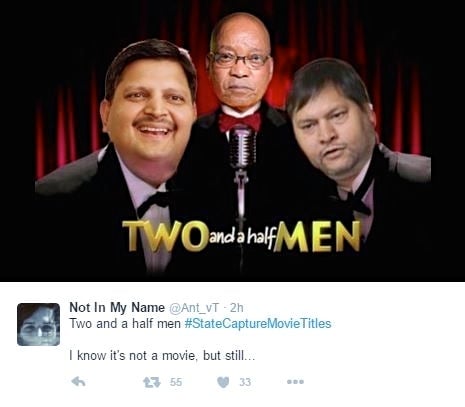The Guptas: How one family’s name became shorthand for corruption in South Africa
It could have been another inspiring immigrant story. Atul Gupta, a young man from Saharanpur in northern India, is sent by his father to find success across the ocean. He looks to South Africa and sees opportunity amid the political and economic turmoil of the country’s transition in the early 1990s. As his gamble pays off, his brothers join and he builds an empire in his adopted home.


It could have been another inspiring immigrant story. Atul Gupta, a young man from Saharanpur in northern India, is sent by his father to find success across the ocean. He looks to South Africa and sees opportunity amid the political and economic turmoil of the country’s transition in the early 1990s. As his gamble pays off, his brothers join and he builds an empire in his adopted home.
Instead, that story is now met with deep skepticism and open anger by South Africans who see the Gupta family’s ascent as symbolic of all that is rotten in local politics. Since 1993, the Guptas have established enterprises ranging from coal and uranium mining, the technology industry, and a national newspaper and 24-hour news channel, all under the holdings company Oakbay Investments. Rather than a bootstraps success story, the family’s close relationship with embattled president Jacob Zuma has made them the target of political lashings and satirical cartoons.
State Capture
South Africa has struggled to regulate the relationship between business and politics since before its first democratic elections. But, the Guptas have gone beyond political lobbying to what analysts describe as state capture, “a system in which one or a few individuals hold specific political figures ransom and bully their way to individual gain.”
The first big scandal that tipped things over the edge for many South Africans was the Guptas’ use of a military air base to welcome wedding guests.
In 2013, the family was granted permission to land a commercial jet filled with wedding guests at the Waterkloof Air Force Base. A police escort then ushered the family, Bollywood stars and Indian bureaucrats on the two-hour drive to a luxury resort where the spectacular wedding was held. What followed was a public outcry, a report and little else.
Since then, there have been a string of scandals. The most recent allegation is that the country’s mining minister facilitated a deal that could see the family take control of the coal supply to South Africa’s national electricity utility. Minister Mosebenzi Zwane denied this. The family maintains that less than one percent of their business is with the government.
Opposition parties have come down hard on Zuma over the matter. The radical Economic Freedom Fighters party (EFF) accused the president of selling the country “over a plate of curry”, a statement a Gupta family spokesman was xenophobic and designed to incite violence in a country still struggling with the aftermath of recent attacks on African immigrants and sometimes fraught race relations. Some have questioned, including the president’s son, why the focus on the Guptas, when there are much richer white South Africans who maintain political influence and economic dominance. But that has done little to assuage public anger.
The Zuptas
The relationship between the Guptas and the Zumas has flourished despite the controversy, causing opposition party members to dub them the ‘Zuptas’. Duduzane Zuma, the president’s son has become a multimillionaire after working his way up as an intern in the family’s companies, according to Nazeem Howa, CEO of Oakbay Investments. Duduzane’s twin, Duduzile, was a director of the family’s tech company, but has since resigned. One of Zuma’s wives also reportedly worked for the family’s mining company as a communications officer.
“Why should it bother me?” Zuma asked in interview in January this year, when asked about the criticism.“Do you know the Guptas have been the friends of the presidents of this country? I am not the first one.”
South Africans have responded with jokes and memes but the extent of the family’s power became unsettling when the deputy finance

minister revealed that the family had offered him his boss’ job, right before Zuma fired finance Minister Nhlanhla Nene without warning in December last year. Another parliamentarian revealed in a Facebook post that the family summoned her to their home and dangled the ministry of public enterprises in front of her—the department that runs South Africa’s national airline, power supplier and rail network. The Guptas denied the accusations and Zuma rubbished the claims that he was handing over his constitutional responsibility to his social circle.
A crumbling empire
With Zuma’s power seemingly weakened after the country’s highest court ruled against him over another scandal, the Gupta empire seems to be crumbling. Major banks are now refusing to do business with them and their auditors, KPMG, have dumped them in a move one analyst described as a “coordinated… act of corporate social responsibility.”
Last week, members of the Gupta family and Zuma’s son resigned as executive and non-executive members of Oakbay Investments.
Getting rid of the Guptas is not expected to solve South Africa’s corruption woes. South Africans believe the family was able to capitalize on a system with little regulation of the line between business and politics. They did so brazenly because accountability is rare in the system. Unless those boundaries are clarified and respected, another family is likely to take the Guptas’ place in South Africa’s political lexicon.